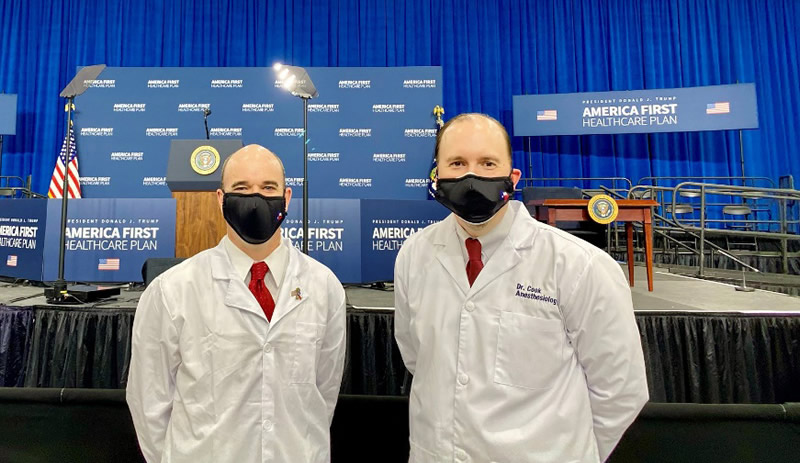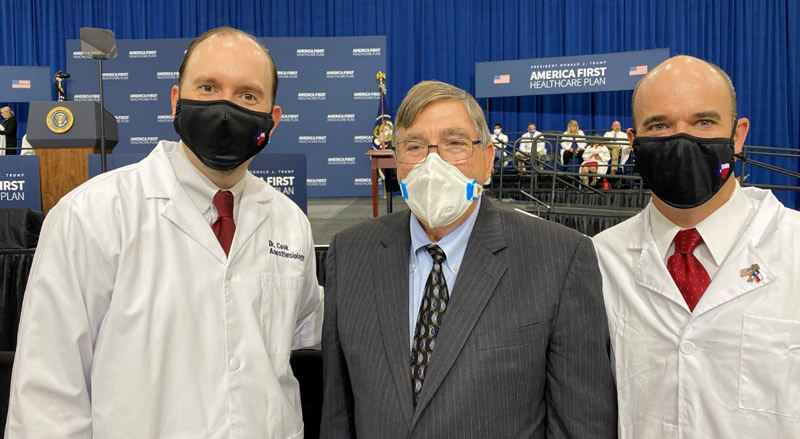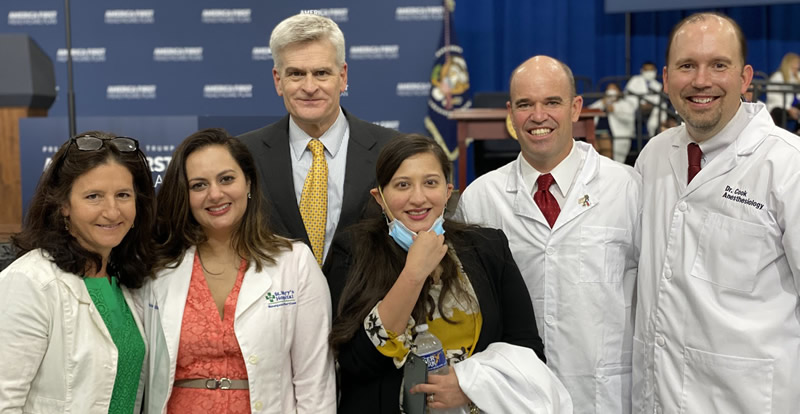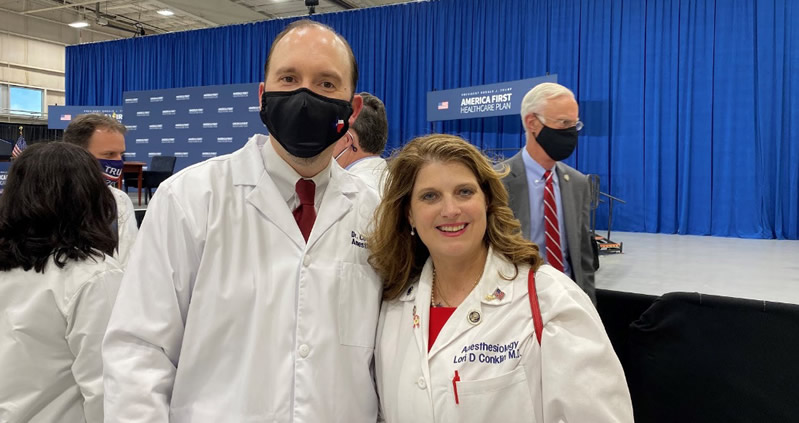VOLUME 33, ISSUE 1
TSA and ASA Executive Branch Advocacy:
If you don’t speak up you will never be heard.
Jeremie Perry, M.D., FASA
Zach Jones, M.D., FASA
Christopher Cook, D.O., FASA

As Anesthesiologists, we’re accustomed to experiencing the highs and lows of the roller coaster of life and practice. Over the end of September, the TSA and ASA faced a significant test of our fabric.
Traditionally, the ASA PAC has avoided direct candidate support in presidential elections. This is attributed to the steep price of fundraising and potential risk where an election loss could leave a president in office that could single handedly write an executive order (EO) profoundly damaging the specialty or the house of medicine. What follows is a recent Executive Branch advocacy story and lesson “If you don’t speak up you will never be heard.”
On September 17th, Drs. Chris Cook, Zach Jones, and Jeremie Perry received a call from Dr. Evan Pivalizza, immediate past president of the Texas Society of Anesthesiologists. He had been alerted by David Balat representing the Texas Public Policy Foundation (TPPF) and a champion for conservative voices in healthcare, that there would be an opportunity to be on-stage for a major healthcare EO announcement by President Donald Trump on Thursday, September 24th in Charlotte, North Carolina. Regardless of location on the political spectrum, the opportunity to engage and participate in a healthcare policy event could not be missed. As many may be aware, we have a strong relationship with TPPF as attendees and supporters of their annual policy orientation event and coordination of advocacy efforts when aligned with ours.
Given the urgency for names to be submitted to the White House (WH), three TSA members in excellent standing with active leadership, involvement and advocacy roles in the Society were approached, time restraints prevented for a wider call for volunteers. The volunteers, who all immediately affirmed interest, were:
- Chris Cook, a leader in TSA media relations as Chair of the Communications Committee, member of the Patient Safety and TSA Members Serving the TMA Committees as well as a member on the Editorial and TSAPAC Boards.
- Zach Jones, a visible, effective key contact, and member of the Governmental Affairs, Bylaws, Communications, and TSA Members Serving the TMA Committees and TSAPAC Board, with a passion for public health issues including vaccination; and
- Jeremie Perry, leads our efforts for transparency standardized anesthesia consent forms serving on the Texas Medical Disclosure Panel, Chair of the Professional Development Committee, and a member of numerous other committees.
The five of us quickly began group discussions and texting to coordinate logistics and details for the event, although specifics were still unknown. Nonetheless, palpable excitement began to develop which was tempered with the news of the passing of Justice Ruth Bader Ginsburg and we waited patiently for the start of the new week. The suspense was broken late Monday afternoon as each of the 3 volunteers received an email invitation from the WH asking us to confirm interest in attending the event. It appeared that the event was moving forward and would be Thursday in an airport hangar at 4:30 p.m. in Charlotte. Over a group FaceTime that evening, we set a 15-minute record for coordinating and purchasing airline tickets to the event with an itinerary that put us there and back again from DFW in less than 13 hours. We chose to travel light with no bags other than what we needed to bring, the distinctive white coat we were requested to wear.
Excitement increased on Tuesday morning when we received phone calls from the WH asking if we would be willing to stand with a group of 20-30 physicians chosen to be on stage behind the President and likely on camera. Obviously, we all said yes and eagerly anticipated travel.
Unfortunately, on Wednesday morning, disappointment surfaced when we received word from Dr. Sherif Zaafran that concerns had appeared related to the proposed EO. Several Washington sources were hearing that an announcement regarding Surprise Medical Bills (SMB) would likely have catastrophic consequences for us and all hospital-based physicians. A message was filtering down that the EO would require hospitals, as part of their Conditions of Participation for treating Medicare beneficiaries, to ensure that all providers at their facility be in-network with the same health insurance companies as the hospital.
As most members are aware, the genesis of a SMB is the failure of insurance companies to create an adequate network in the interest of pursuing increasing profits. If they fail to reach a contractual agreement with physicians or break a contract, physicians are designated as out-of-network, with different levels of coverage and potentially greater cost for patients. While insurance companies are notorious for claiming that failure to reach a contract with in-network physicians is the fault of the physician, the facts do not support these claims. Insurance companies in 2020 at the height of a worldwide pandemic are reporting record profits and states with arbitration in place report that the vast majority of settlements are in favor of physicians rather than the insurance industry.
As proposed, the EO would have mandated that hospitals credential in-network physicians in order to comply with Medicare Conditions of Participation which would force physicians who work at that hospital to take whatever was offered by insurance companies which could be as low as 25% of commercial market rates if linked to Medicare. Most physicians would be unable to sustain a practice at this level of egregious payment and risks subjugation of physician treatment decisions to the best interest of a hospital employer or insurance company.
Discouraged with the potentially detrimental EO, multiple lines of communication were opened in addition to the continued discussion with Manny Bonilla at the ASA office and David Balat who was at the WH. Dr. Jones contacted Congressman Michael Burgess (senior physician legislator in Congress) whose office also had a lack of detail. At this stage, a decision was required whether it would be appropriate to be visible behind the President for an announcement that represented an existential threat to our specialty, and we decided NOT to stand behind the President. Multiple TSA members urgently reached out to their legislators and contacts in DC with our grave concern, including Drs. Ray Callas, Sherif Zaafran, Deborah Plagenhoef, Jeff Plagenhoef, and many more.
Without further details from the WH, it became clear that we would be going into the event in the dark. To emphasize our concern, Dr. Jones advised Congressman Burgess’ office that he would not be attending the event. Dr. Zaafran indicated that physicians from his group (USAP) were also declining attendance and David Balat shared that several of his physician contacts were traveling to Charlotte, but were prepared to step down if the EO went forward as we understood. This was the course that Drs. Cook and Perry chose to take.
On the plane Thursday morning Dr. Perry reached back to the WH via email and explained his reluctance to participate in an announcement that had such deleterious consequences for physicians and patients. He was put in touch with Dr. Heidi Overton, a WH fellow working on organizing the rally, and was told that she could give him details on the announcement between 1:00 and 1:30 p.m. Once on the ground, Dr. Perry initiated contact with Dr. Overton who advised that she understood his concerns and indicated that the EO had been drafted out of frustration that no progress had been made in Congress despite the urgency of the issue. Dr. Perry noted that, as written, the EO placed all negotiating power in the hands of insurance companies reaping record profits while severely limiting the contracting ability of independent physicians. It appeared that many physicians had similar comments and she agreed that being on stage would be awkward in the face of the proposed EO. After discussing with TSA colleagues, Drs. Cook and Perry chose to travel to the event with that strategy.
Once at the venue, Drs. Cook and Perry networked with multiple physicians including Dr. Marion Mass, a pediatrician and influential physician advocate from Pennsylvania, Dr. Lori Conklin, anesthesiologist and vice president of the Virginia Medical Board, Dr, Mark Ellis, anesthesiologist from North Carolina and several orthopedic surgeons including former Florida state Representative Dr. Julio Gonzalez all of whom had the same concerns. We also met with important legislators including Congressman Burgess (TX), and US Senator Cassidy (LA), who has proposed a sensible, reasonable solution to SMB using an arbitration style resolution such as the one that has worked well in Texas, Georgia, and New York. Everyone indicated that they had been explaining the gravity of the situation to the WH. This was incredible grass root physician advocacy in action prior to and at the event.




Incredibly, about 30 minutes prior to the anticipated start of the event, word came down initially from Dr. Zaafran via text that the SMB EO would be modified to delay the Medicare option and put pressure on Congress to develop a solution by January 1st. Positive emotions were palpable. Fist bumps were evident all around and the atmosphere quickly became one of excitement as the music played for the President’s entrance. The President outlined his America First Healthcare Plan.
With the avoidance of immediate harm to our specialty, we have a brief respite, but the danger has not ended. We still have not determined who created the EO. Drs. Cook and Perry were invited and participated in a WH call the following Tuesday, September 29th, where Dr. John Fleming, assistant to the President for planning and implementation in the office of the Chief of Staff stated clearly that physicians in financial danger was one of the major problems in healthcare and when he and WH Chief of Staff Mark Meadows were privy to the EO, they assisted in amending the President’s position.
This is our story of a near disaster, an advocacy alert and immediate, effective response from TSA members, a political hand played and a pivot to a future battle for organized medicine for appropriate physician protection over SMB. We hope we can look back on September 2020 as a month we began to turn the tide. There are many times where individuals’ efforts seem futile and concerns appear to be of limited impact. Well, not this time! TSA members and physicians across the country spoke up and were heard. The importance of prior contacts and established relationships with the legislative branch cannot be emphasized enough and the TSA is grateful to all the members who activated their responses on that Wednesday and Thursday in late September.
Stay tuned for developments over the next 3 months. We all need to remain engaged to ensure that appropriate, equitable legislation develops which allows for physician participation and arbitration rather than unilateral insurer actions and malfeasance which would decrease payments for anesthesiology services to unsustainable levels.
